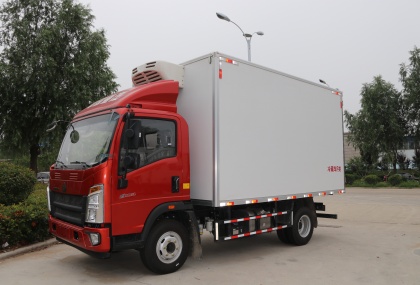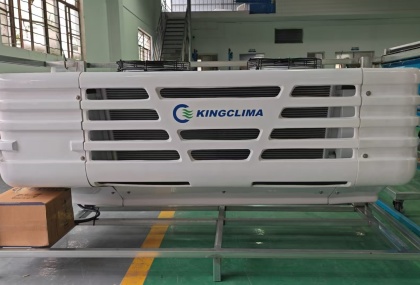Key tips for choosing a transportation refrigeration
Choosing an aftermarket transportation refrigeration unit involves evaluating your specific needs, the nature of the cargo, and operational requirements. Here’s a step-by-step guide to help you make the best choice:
1. Assess Your Cargo Needs
Temperature Requirements:
Determine the temperature range your cargo needs (e.g., frozen, chilled, or multi-temperature).
Check if the unit can meet those specific temperature settings.
Cargo Volume:
Consider the size of your van or truck and the volume of goods you’ll transport. Larger vehicles require more powerful units.
Type of Goods:
Perishable food, pharmaceuticals, or flowers may have unique storage requirements like humidity control or temperature stability.

2. Evaluate Power Options
Truck-Powered Units:
These use the vehicle’s engine to power the refrigeration unit.
Pros:
Generally more affordable upfront and simpler to install.
Cons:
Adds wear to the vehicle’s engine and increases fuel consumption.
Independent-Powered Units:
Equipped with their own power source, such as a separate engine or battery.
Pros:
Reduces strain on the vehicle’s engine and allows operation while the vehicle is off.
Cons:
Higher initial cost and more complex installation.
3. Consider Fuel Efficiency
Opt for units designed to minimize fuel consumption. Modern electric or hybrid units are often more efficient than traditional diesel-powered units, reducing operational costs.
4. Cooling Technology
Direct Drive:
Ideal for small and medium-sized vehicles.
Runs off the vehicle’s engine, suitable for short-distance transportation.
Self-Contained:
Comes with a separate engine or power source, suitable for long hauls and larger vehicles.
_副本.jpg)
5. Noise Levels
In urban or residential delivery settings, a quieter refrigeration unit may be essential.
Battery-powered units often have lower noise levels compared to diesel-powered units.
6. Climate and Route Considerations
Climate:
Choose a unit that can perform well in the typical temperature and weather conditions of your delivery routes.
Route Distance:
For long-distance routes, ensure the unit has the capacity for continuous cooling over extended periods.
7. Energy Source Compatibility
If considering electric or hybrid units, ensure your truck or van can support the power needs of the refrigeration unit.
8. Durability and Reliability
Look for units made with high-quality materials that can withstand rough roads and frequent use.
Choose brands or models with a reputation for reliability and low maintenance needs.
9. Maintenance and Servicing
Ease of Maintenance:
Choose a unit that’s easy to maintain with accessible parts.
Local Support:
Ensure that spare parts and servicing facilities are available in your region.
10. Warranty and After-Sales Support
Check the warranty period and what it covers.
Ensure the manufacturer or distributor provides good customer support and technical assistance.
11. Budget and Cost
Initial Cost:
Set a budget and compare options that fit within your financial plan.
Operating Costs:
Consider fuel efficiency, maintenance, and repair costs over the unit's lifespan.
12. Regulatory Compliance
Make sure the unit complies with local and international regulations, particularly for refrigerated transport in industries like food and pharmaceuticals.
13. Multi-Temperature Capability
If you plan to transport goods with different temperature needs, consider units with dual or multi-temperature compartments.
14. Reviews and Recommendations
Research reviews from other users in your industry.
Ask for recommendations from peers or professionals who use similar refrigeration units.
15. Manufacturer Reputation
Stick to reputable brands known for producing reliable and efficient transportation refrigeration units. Examples include Thermo King, Carrier Transicold, and Kingclima.
Conclusion
Choosing the right aftermarket transportation refrigeration involves balancing your cargo needs, operational efficiency, and budget. By carefully evaluating these factors and comparing available options, you can select a unit that meets your requirements, ensures consistent performance, and delivers long-term value. As a professional aftermarket transportation refrigeration supplier, Kingclima offer 7*24 professional and patient help, if you need, please feel free to contact us.
-
From Farm to Table: Trust Our Refrigeration Systems to Deliver Freshness!
2025-09-26 15:23:09
The journey of perishable goods—from farm harvests to grocery shelves—demands precision, reliability, and unwavering temperature control. Any breakdown in the cold chain can result in spoilage, financial losses, and compromised food safety. That’s why leading logistics providers and food distributors rely on advanced truck refrigeration systems to ensure their cargo arrives fresh, safe, and market-ready.
read more
-
Don’t Let the Heat Spoil Your Haul – Try Our Advanced Refrigeration Systems!
2025-09-26 14:55:58
In the world of perishable freight, temperature control isn’t just a feature—it’s a necessity. Whether you're transporting fresh produce, dairy, pharmaceuticals, or frozen seafood, a single degree of deviation can mean the difference between profit and loss. At kingclima, we engineer high-performance truck refrigeration systems that combat heat, humidity, and harsh conditions—ensuring your cargo arrives in pristine condition, every time.
read more
-
Reliable Cooling for Every Mile – Explore Our Truck Refrigeration Range!
2025-09-25 16:15:32
At kingclima, we understand that your refrigerated cargo represents more than just inventory - it's your reputation, your customers' trust, and your bottom line. Our comprehensive range of truck refrigeration systems delivers military-grade reliability combined with cutting-edge technology to protect your temperature-sensitive shipments across every mile of their journey.
read more

_副本.jpg)
.jpg)

